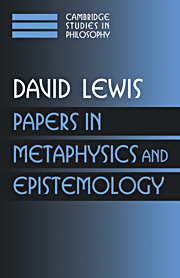Book contents
- Frontmatter
- Contents
- Introduction
- 1 New work for a theory of universals
- 2 Putnam's paradox
- 3 Against structural universals
- 4 A Comment on Armstrong and Forrest
- 5 Extrinsic properties
- 6 Defining ‘intrinsic’ (with Rae Langton)
- 7 Finkish dispositions
- 8 Noneism or allism?
- 9 Many, but almost one
- 10 Casati and Varzi on holes (with Stephanie Lewis)
- 11 Rearrangement of particles: Reply to Lowe
- 12 Armstrong on combinatorial possibility
- 13 A world of truthmakers?
- 14 Maudlin and modal mystery
- 15 Humean Supervenience debugged
- 16 Psychophysical and theoretical identifications
- 17 What experience teaches
- 18 Reduction of mind
- 19 Should a materialist believe in qualia?
- 20 Naming the colours
- 21 Percepts and color mosaics in visual experience
- 22 Individuation by acquaintance and by stipulation
- 23 Why conditionalize?
- 24 What puzzling Pierre does not believe
- 25 Elusive knowledge
- Index
1 - New work for a theory of universals
Published online by Cambridge University Press: 08 February 2010
- Frontmatter
- Contents
- Introduction
- 1 New work for a theory of universals
- 2 Putnam's paradox
- 3 Against structural universals
- 4 A Comment on Armstrong and Forrest
- 5 Extrinsic properties
- 6 Defining ‘intrinsic’ (with Rae Langton)
- 7 Finkish dispositions
- 8 Noneism or allism?
- 9 Many, but almost one
- 10 Casati and Varzi on holes (with Stephanie Lewis)
- 11 Rearrangement of particles: Reply to Lowe
- 12 Armstrong on combinatorial possibility
- 13 A world of truthmakers?
- 14 Maudlin and modal mystery
- 15 Humean Supervenience debugged
- 16 Psychophysical and theoretical identifications
- 17 What experience teaches
- 18 Reduction of mind
- 19 Should a materialist believe in qualia?
- 20 Naming the colours
- 21 Percepts and color mosaics in visual experience
- 22 Individuation by acquaintance and by stipulation
- 23 Why conditionalize?
- 24 What puzzling Pierre does not believe
- 25 Elusive knowledge
- Index
Summary
INTRODUCTION
D. M. Armstrong offers a theory of universals as the only adequate answer to a ‘compulsory question’ for systematic philosophy: the problem of One over Many. I find this line of argument unpersuasive. But I think there is more to be said for Armstrong's theory than he himself has said. For as I bear it in mind considering various topics in philosophy, I notice time and again that it offers solutions to my problems. Whatever we may think of the problem of One over Many, universals can earn their living doing other much-needed work.
I do not say that they are indispensable. The services they render could be matched using resources that are Nominalistic in letter, if perhaps not in spirit. But neither do I hold any presumptionagainst universals, to the effect that they are to be accepted only if we have no alternative. I therefore suspend judgement about universals themselves. I only insist that, one way or another, their work must be done.
I shall investigate the benefits of adding universals to my own usual ontology. That ontology, though Nominalistic, is in other respects generous. It consists of possibilia - particular, individual things, some of which comprise our actual world and others of which are unactualised - together with the iterative hierarchy of classes built up from them.
Information
- Type
- Chapter
- Information
- Papers in Metaphysics and Epistemology , pp. 8 - 55Publisher: Cambridge University PressPrint publication year: 1999
Accessibility standard: Unknown
Why this information is here
This section outlines the accessibility features of this content - including support for screen readers, full keyboard navigation and high-contrast display options. This may not be relevant for you.Accessibility Information
- 41
- Cited by
